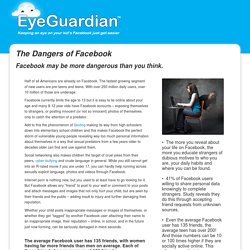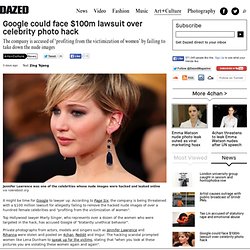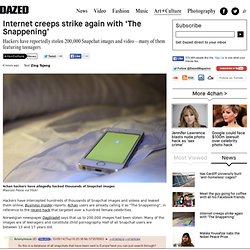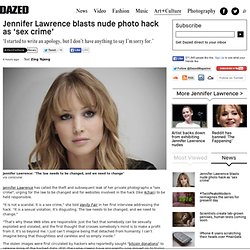

Facebook is dangerous for teens. Protect kids from Facebook porn, stalkers, sexting and bad influences. Half of all Americans are already on Facebook.

The fastest growing segment of new users are pre-teens and teens. With over 250 million daily users, over 10 million of those are underage. Facebook currently limits the age to 13 but it is easy to lie online about your age and many 8-12 year olds have Facebook accounts – exposing themselves to strangers, or posting innocent (or not so innocent) photos of themselves only to catch the attention of a predator. Add to this the phenomenon of Sexting making its way from high schoolers down into elementary school children and this makes Facebook the perfect storm of vulnerable young people revealing way too much personal information about themselves in a way that sexual predators from a few years older to decades older can find and use against them.
Social networking also makes children the target of cruel jokes from their peers, cyber-bullying and crude language in general. Taking a wrong turn on Facebook can happen in seconds. Google could face $100m lawsuit over celebrity photo hack. It might be time for Google to lawyer up.

According to Page Six, the company is being threatened with a $100 million lawsuit for allegedly failing to remove the hacked nude images of over a hundred female celebrities and "profiting from the victimization of women". Top Hollywood lawyer Marty Singer, who represents over a dozen of the women who were targeted in the hack, has accused Google of "blatantly unethical behavior". Private photographs from actors, models and singers such as Jennifer Lawrence and Rihanna were stolen and posted on 4chan, Reddit and Imgur. The hacking scandal prompted women like Lena Dunham to speak up for the victims, stating that "when you look at these pictures you are violating these women again and again".
Singer has written a strongly-worded letter to Google that states that the company failed "to act expeditiously, and responsibly to remove the images, but in knowingly accommodating, facilitating, and perpetuating the unlawful conduct. Internet creeps strike again with ‘The Snappening’ Hackers have intercepted hundreds of thousands of Snapchat images and videos and leaked them online, Business Insider reports. 4chan users are already calling it as “The Snappening”, in reference to the recent hack that targeted over a hundred female celebrities.

Norweigian newspaper Dagbladet says that up to 200,000 images had been stolen. Jennifer Lawrence blasts nude photo hack as ‘sex crime’ Jennifer Lawrence has called the theft and subsequent leak of her private photographs a "sex crime", urging for the law to be changed and for websites involved in the hack (like 4chan) to be held responsible.

"It is not a scandal. It is a sex crime,” she told Vanity Fair in her first interview addressing the hack. “It is a sexual violation. It’s disgusting. The law needs to be changed, and we need to change. " "That’s why these Web sites are responsible. The stolen images were first circulated by hackers who reportedly sought "bitcoin donations" to release more of the hacked data.
Lawrence said that she was tempted to write a statement after her images were leaked. An iCloud security flaw was initially blamed for the breach of privacy, although Apple later said that the hackers had gained access via targeted attacks on user names, passwords and security questions. The Hunger Games actor also had some strong words for people who looked at the images. Free wi-fi hotspots pose data risk, Europol warns.
6 March 2014Last updated at 22:11 ET By Dan Simmons Click presenter Rory Cellan-Jones explains why Europol is warning people to change their habits Sensitive information should not be sent over public wi-fi hotspots, to avoid hackers stealing it, Europe's top cybercrime police officer has warned. Troels Oerting, head of Europol's cybercrime centre, told BBC Click people should send personal data only across networks they trusted. He said the warning was motivated by the growing number of attacks being carried out via public wi-fi. Europol is helping a number of countries after such attacks, he said. Stolen data "We have seen an increase in the misuse of wi-fi, in order to steal information, identity or passwords and money from the users who use public or insecure wi-fi connections," he said.
"We should teach users that they should not address sensitive information while being on an open insecure wi-fi internet. Sensitive data should only be swapped via home networks 'Man in the middle' Nude 'Snapchat images' put online by hackers. Online crowd can guess what you want to watch or buy - tech - 02 October 2014. WHAT do you fancy doing tonight?

Just ask a bunch of strangers. Online firms like Netflix and Amazon use algorithms to try to second-guess our desires. Now a team of researchers is bringing people back into the equation, using crowds of online workers to find your fancy. Netflix-like algorithms work well when they have large amounts of data to learn from, but they fall down when asked to divine human preferences about sets of objects that are either very niche, personal or in flux. That's not a problem for humans, so Peter Organisciak at the University of Illinois at Urbana-Champaign and his team wondered if crowdsourcing could work out what we like with very little data to work with.
Emma Watson: Being a feminist doesn't make me 'man-hating'